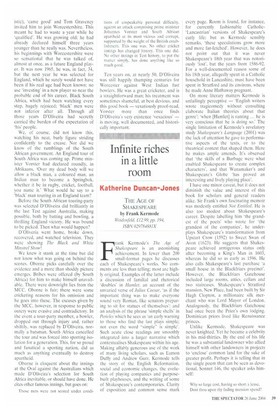Infinite riches in a little room
Katherine Duncan-Jones
THE AGE OF SHAKESPEARE by Frank Kermode Weidenfeld, £12.99, pp. 194, ISBN 029784881X Frank Kermode's The Age of Shakespeare is an astonishing achievement. In fewer than 200 small-format pages he discusses each of Shakespeare's works. No comments are less than telling; most are highly original. Examples of the latter include a discussion of familial and rhetorical 'doubles' in Hamlet; an account of the unvaried verse of Julius Caesar, 'as if the important thing was to make everyone sound very Roman, like senators preparing to sit for statues of themselves'; and an analysis of the phrase 'simple shells' in Pericles which he sees as 'an early warning to those who find the last plays simple; not even the word "simple" is simple'. Such acute close readings are smoothly integrated into a larger narrative which contextualises Shakespeare within his age. Making affably generous use of the work of many living scholars, such as Eamon Duffy and Andrew Gurr, Kermode tells the story of the English Reformation, social and economic changes, the evolution of playing companies and purposebuilt playhouses, and the writing of some of Shakespeare's contemporaries. Clarity of exposition and common sense mark
every page. Room is found, for instance, for currently fashionable Catholic'Lancastrian' versions of Shakespeare's early life; but as Kermode sensibly remarks, 'these speculations grow more and more far-fetched'. However, he does not point out that it was never Shakespeare's 18th year that was notoriously 'lost', but the years from 1586-92. For a well-documented reason some of his 18th year, allegedly spent in a Catholic household in Lancashire, must have been spent in Stratford and its environs, where he made Anne Hathaway pregnant.
On more literary matters Kermode is unfailingly perceptive — 'English writers wrote tragicomedy without consulting elaborate Italian theories about that genre'; 'when [Hamlet] is ranting ... he is very conscious that he is doing so.' The single limitation of Kermode's revelatory study Shakespeare's Language (2001) was the lack of attention he gave to performative aspects of the texts, or to the theatrical context that shaped them. Here he makes ample amends. It's observed that 'the skills of a Burbage were what enabled Shakespeare to create complex characters', and that Wanamaker's and Shakespeare's Globe 'has proved an interesting and lively playing place'.
I have one minor caveat, but it does not diminish the value and interest of this book for scholars and general readers alike. Sir Frank's own fascinating memoir was modestly entitled Not Entitled. He is also too modest about Shakespeare's career. Despite labelling him 'the grandest of the poets' who wrote for 'the grandest of the companies', he underplays Shakespeare's transformation from Upstart Crow (1592) to Sweet Swan of Avon (1623). He suggests that Shakespeare achieved armigerous status only after becoming a King's Man in 1603, whereas he did so as early as 1596. He also calls Shakespeare's last purchase 'a small house in the Blackfriars precinct'. However, the Blackfriars Gatehouse included large rooms, attics, cellars and two staircases. Shakespeare's Stratford mansion, New Place, had been built by Sir Hugh Clopton, a millionaire silk merchant who was Lord Mayor of London. Analogously, the Blackfriars Gatehouse had once been the Prior's own lodging. Dominican priors lived like Renaissance princes.
Unlike Kermode, Shakespeare was never knighted. Yet he became a celebrity in his mid-thirties. By the end of his life he was a substantial landowner who allied himself with other landowners in projects to 'enclose' common land for the sake of greater profit. Perhaps it is telling that in the single poem that can be seen as devotional, Sonnet 146, the speaker asks himself:
Why so large cost, having so short a lease, Dost thou upon thy fading mansion spend?


































































 Previous page
Previous page